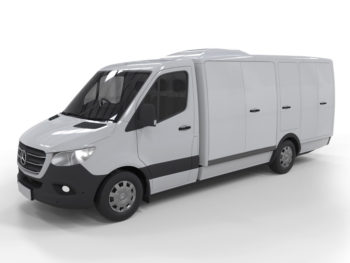Mercedes-Benz Vans UK is to launch an ultra-lightweight body for its Sprinter chassis, which will be offered in dry freight and refrigerated transport models early in 2020.

The bodies, which promise over 40% more payload than a conventional body for a similar cubic capacity, will lead to reduced fuel consumption, lower CO2 emissions and increased productivity for delivery companies.
For more than two years, the company has been working as part of Project FLAVA, the Flexible Lightweight Architectures for Vehicle Applications. The project, which includes Midlands engineering specialist Penso, the Advanced Propulsion Centre and Innovate UK, along with materials specialist Solvay, has involved the development of composite structural materials for a range of automotive applications.
“We’ve been a player in the e-grocery home delivery market for 20 years,” said Mercedes-Benz Vans UK’s sales director Simon Neill.
“We’ve been trying to deliver as much payload as possible, as these customers are always payload-compromised. However, we have always focused on the van or the chassis, never on the second stage of the process, the bodies.”
Penso, which worked with Mercedes-Benz Vans on the development of the firm’s London taxi some years ago, has developed a carbon fibre-based composite material, which incorporates recycled plastic bottles. This sheet material is incredibly strong and highly insulating, making it suitable for multi-temperature delivery bodies. The company has also looked at the aerodynamics of the body, creating a structure that more closely follows the contours of the Sprinter cab, yet also offers an increase in overall load volume.
The results have been trialled with a number of potential cycles. Based on a front-wheel drive 3.5-tonne Sprinter chassis, the lightweight body is said to offer up to 47% more payload in a triple compartment e-grocery body. That means that the customer could carry 1,250kg of goods, up from around 850kg in a conventional delivery van.
With fuel savings of up to 30% over a full duty cycle, the company is also predicting that the lightweight body could contribute to a CO2 reduction of 25-tonnes over a five-year ownership period.
Penso has established a production facility in Coventry, to produce a range of up to 30 lightweight body types, including dry freight, single, double, triple and quadruple temperature-controlled e-grocery bodies, high-roof and Luton bodies. These will initially be available for Mercedes-Benz Sprinter chassis and will be offered through the company’s Ready-To-Work programme. They incorporate Mercedes door handles and locks, to allow the vehicle’s central locking system to function.
Mercedes-Benz has also been working with a range of e-fridge suppliers to provide the temperature-controlled vans with a fridge solution that is compatible with Sprinter’s standard Start/Stop system.
“We will be having a lightweight solution for dry freight and fridge/freezer use in 2020 through the Ready-To-Work offer,” said Neill.
The lightweight bodies will carry a premium over a standard body, despite the economies of scale that are being created at the Coventry site. However, with a standard 10-year warranty on the body, Mercedes-Benz Finance can provide separate funding for the body and the chassis if required, rather like a heavy truck being purchased separately to the trailer.

